
Out of the thirty-five million persons composing Canada’s population, almost ten percent have accrued criminal records of some kind. Any such person may apply for a criminal pardon – also known as a record suspension – in order to get their personal lives back on course; however, the fee that such a person must pay in order to apply currently amounts to $631 in Canadian currency.
The government policy changes that originally led to today’s steeper fees and waiting times for eligibility for pardons were among other Conservative motions that were instated during the term of the previous Prime Minister of Canada, Stephen Harper. Prior to these changes, persons with summary convictions and persons with indictable offenses had to wait three and five years, respectively, in order to be able to apply for pardons, and it originally cost $150 to apply. Now, in addition to pardons having become four times as expensive, lesser and greater offenses force persons to wait five and ten years, respectively, in order to apply.
Under a Liberal government headed by Prime Minister Justin Trudeau, many of the changes made in the Harper era have come under heavy scrutiny. One such change was to render all marijuana use illegal; with the Liberal government moving to legalize marijuana use for recreational purposes, many are now asking that persons that were originally convicted for using this during the Harper term receive pardons. Ralph Goodale, the Public Safety Minister, also announced in 2016 that there would be a federal reevaluation of how much more fair a pardon’s cost and waiting time should be.
As part of the Trudeau government’s direction, the Parole Board of Canada issued a consultation polling citizens on how they felt about the pardon’s fee, and its findings – as well as a selection of prose responses made by many of the persons that responded – were made available to the public because of the Access to Information Act.
The consultation found that less than one sixth of the three million Canadian persons with criminal records felt that the application fee was reasonable. Among those that felt differently, a commonly cited factor that made the fee more difficult to surmount was the lack of viable income available to them, which in many cases was an outcome of their criminal records making it difficult to find work and travel to begin with. Many of those that answered the parole board’s consultation claimed that the fee renders some persons outright disinterested in seeking a pardon or rehabilitation.
Are you interested in applying for a Criminal Pardon, or do you need some legal advice? Contact Julian van der Walle today to find out how we can help you.
Related Stories
Is Cyberbullying a Crime You Can Be Committed of in BC, Canada?
Cyberbullying has made headlines recently, in large part due to its connection to various heart-breaking suicides and attempts. In particular, the increase in suicides among teens and millennials is often attributed to instances of cyberbullying....
Charged with Possession of a Narcotic in British Columbia, Canada? Understand What It Means
Under Canadian law, the Controlled Drug and Substances Act makes it illegal for anyone to possess certain narcotics. The law allows Crown Counsel to bring a criminal case against violators, which can result in criminal fines and even time in jail....
Why do you have the right to remain silent?
The Presumption of Innocence and Police Conduct: Why You Have the Right to Remain Silent Section 7 of the Canadian Charter of Rights and Freedoms guarantees all citizens: “the right to life, liberty, and security of the person and the right not to be deprived...
